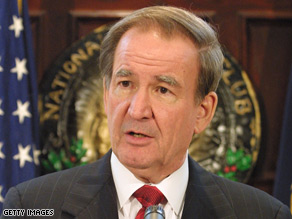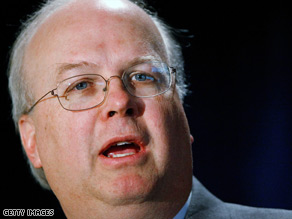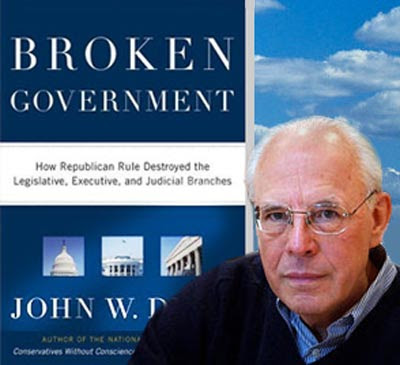Bush economic policy...another success story for supply-side, trickle-down economics!

September 23, 2008
by Thomas F. Schaller
baltimoresun.com
Like it or not, we're all socialists now. You can thank those free-market conservatives and their deregulatory idol, George W. Bush, for that.
Conservatives love to wield the word socialism like some all-purpose, liberal-slaying sword. Redistribution to the poor, the right to unionize and affirmative action are decried as anti-market, unfair advantages for filthy socialists who can't compete and fail to appreciate the almighty, equalizing power of self-determination and an unfettered market.
To social conservatives, Darwinism is merely an unproven "theory" about how our species evolved. But "social Darwinism" is an ineluctable fact: The smart and hardworking prosper, while the stupid and lazy fail.
Yet notice how those same chest-thumping capitalists of talk radio and at the corporate-funded think tanks often fall silent in the face of fixed markets, no-bid contracts, bailouts and subsidies for the very corporations that demand less government oversight when things are going well, then turn to Washington when things go horribly wrong.
The hypocrisies abound.
If unionized teachers were given 15 percent annual raises, regardless of performance, that would be socialist. But when easily repaired military equipment in Iraq is discarded so no-bid defense contractors can charge the automatic 15 percent overhead for replacements (watch Iraq for Sale, a documentary exposing Defense Department contracting), that's the cost of doing business during wartime.
If Congress proposes legislation to extend leniency to Americans who, because of unexpected medical expenses or a job recently shipped overseas, go bankrupt, Republicans fret about governmental dependency. But when Chrysler, insurance giant AIG or the airlines after 9/11 take Beltway bailouts, executives such as Lee A. Iacocca are still esteemed as corporate masters of the universe.
If affirmative action provides a minority or female applicant the inside track for a job or college admission, conservatives lecture us about the power of competition. But when the pharmaceutical companies and the Bush administration collude in passing a Medicare Part D prescription drug bill that expressly prohibits the government from using its competitive buying power to negotiate the best price for those taxpayer-funded drugs, Fox News cues the video for the latest Paris Hilton scandal.
Propose a national health care program to cover everyone, or invest a mere $7 billion per year over five years to expand the children's health insurance program? Sounds like "each according to need" Marxism. But spend several times that amount to bail out AIG, the nation's largest insurance company? That's, um, market stabilization.
While we're debunking myths, now is a good time to revisit those free-market, tax-cutting promises that economic conservatives have been feeding us for years.
The Dow Jones Industrial Average recently dropped to the level it was back in summer 2001, when Mr. Bush signed the first of his four income-tax cuts. That means that if you put $5,000 into blue chip stocks seven years ago, and rolled another $5,000 into sweat socks and hid them under your mattress, your socks and your stocks would have about the same value today.
And you may have to break those socks out now, because the government's proposed $700 billion bailout of the mortgage and finance industries will translate into $4,000 from the pocket of every employed American. (Plus interest, since the money is all borrowed, and Mr. Bush will soon retire as the fifth straight Republican president to leave office without submitting a single balanced budget.)
Meanwhile, rising unemployment means those who are working will continue to shoulder a larger share of our mounting national debt.
The U.S. economy must generate about 150,000 net new jobs each month just to employ Americans entering the work force from high school, college or the military; in a seven-year period, that requires 12.6 million new jobs just to keep pace. The Bush administration's job creation record these past seven years: 4.7 million.
Those of us who work hard and pay our taxes are getting screwed. Our Christmas bonus this year? The privilege of covering the tab for greedy executives in the deregulated insurance and mortgage industries who scoff at safety nets for you but demand a safety trapeze for themselves.
As I said, we're all socialists now. Too bad all that filthy, pinko socialist redistribution is moving up, rather than down, the economic food chain.
Thomas F. Schaller teaches political science at UMBC. His column appears regularly in The Sun. His e-mail is schaller67@gmail.com.
Article Link: http://www.baltimoresun.com/news/opinion/oped/bal-op.schaller23sep23,0,7915225.column
Copyright © 2008, The Baltimore Sun

September 23, 2008
by Thomas F. Schaller
baltimoresun.com
Like it or not, we're all socialists now. You can thank those free-market conservatives and their deregulatory idol, George W. Bush, for that.
Conservatives love to wield the word socialism like some all-purpose, liberal-slaying sword. Redistribution to the poor, the right to unionize and affirmative action are decried as anti-market, unfair advantages for filthy socialists who can't compete and fail to appreciate the almighty, equalizing power of self-determination and an unfettered market.
To social conservatives, Darwinism is merely an unproven "theory" about how our species evolved. But "social Darwinism" is an ineluctable fact: The smart and hardworking prosper, while the stupid and lazy fail.
Yet notice how those same chest-thumping capitalists of talk radio and at the corporate-funded think tanks often fall silent in the face of fixed markets, no-bid contracts, bailouts and subsidies for the very corporations that demand less government oversight when things are going well, then turn to Washington when things go horribly wrong.
The hypocrisies abound.
If unionized teachers were given 15 percent annual raises, regardless of performance, that would be socialist. But when easily repaired military equipment in Iraq is discarded so no-bid defense contractors can charge the automatic 15 percent overhead for replacements (watch Iraq for Sale, a documentary exposing Defense Department contracting), that's the cost of doing business during wartime.
If Congress proposes legislation to extend leniency to Americans who, because of unexpected medical expenses or a job recently shipped overseas, go bankrupt, Republicans fret about governmental dependency. But when Chrysler, insurance giant AIG or the airlines after 9/11 take Beltway bailouts, executives such as Lee A. Iacocca are still esteemed as corporate masters of the universe.
If affirmative action provides a minority or female applicant the inside track for a job or college admission, conservatives lecture us about the power of competition. But when the pharmaceutical companies and the Bush administration collude in passing a Medicare Part D prescription drug bill that expressly prohibits the government from using its competitive buying power to negotiate the best price for those taxpayer-funded drugs, Fox News cues the video for the latest Paris Hilton scandal.
Propose a national health care program to cover everyone, or invest a mere $7 billion per year over five years to expand the children's health insurance program? Sounds like "each according to need" Marxism. But spend several times that amount to bail out AIG, the nation's largest insurance company? That's, um, market stabilization.
While we're debunking myths, now is a good time to revisit those free-market, tax-cutting promises that economic conservatives have been feeding us for years.
The Dow Jones Industrial Average recently dropped to the level it was back in summer 2001, when Mr. Bush signed the first of his four income-tax cuts. That means that if you put $5,000 into blue chip stocks seven years ago, and rolled another $5,000 into sweat socks and hid them under your mattress, your socks and your stocks would have about the same value today.
And you may have to break those socks out now, because the government's proposed $700 billion bailout of the mortgage and finance industries will translate into $4,000 from the pocket of every employed American. (Plus interest, since the money is all borrowed, and Mr. Bush will soon retire as the fifth straight Republican president to leave office without submitting a single balanced budget.)
Meanwhile, rising unemployment means those who are working will continue to shoulder a larger share of our mounting national debt.
The U.S. economy must generate about 150,000 net new jobs each month just to employ Americans entering the work force from high school, college or the military; in a seven-year period, that requires 12.6 million new jobs just to keep pace. The Bush administration's job creation record these past seven years: 4.7 million.
Those of us who work hard and pay our taxes are getting screwed. Our Christmas bonus this year? The privilege of covering the tab for greedy executives in the deregulated insurance and mortgage industries who scoff at safety nets for you but demand a safety trapeze for themselves.
As I said, we're all socialists now. Too bad all that filthy, pinko socialist redistribution is moving up, rather than down, the economic food chain.
Thomas F. Schaller teaches political science at UMBC. His column appears regularly in The Sun. His e-mail is schaller67@gmail.com.
Article Link: http://www.baltimoresun.com/news/opinion/oped/bal-op.schaller23sep23,0,7915225.column
Copyright © 2008, The Baltimore Sun
Powered by ScribeFire.
















